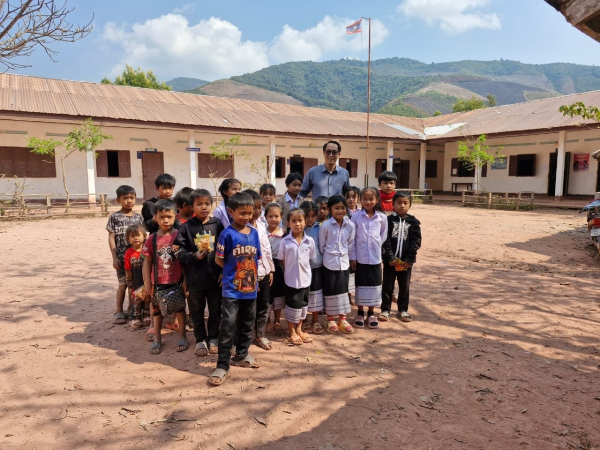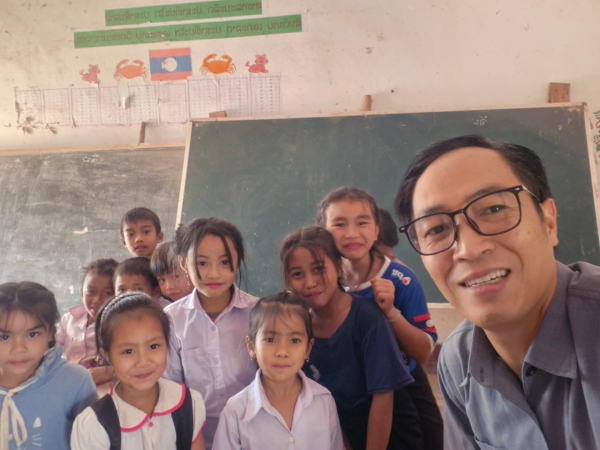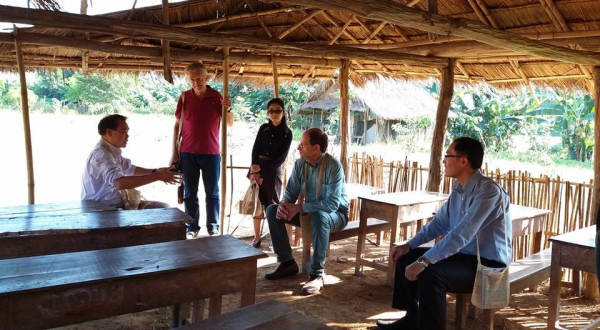KPL
In the heart of Laos, where mountains stretch far and villages rest quietly, lies a silent crisis we must urgently address. In districts like Nga, tucked away in Oudomxay Province, thousands of children are still left behind—not by choice, but by circumstance.

By Dr. HoumphanhKeoounkham
(KPL) In the heart of Laos, where mountains stretch far and villages rest quietly, lies a silent crisis we must urgently address. In districts like Nga, tucked away in Oudomxay Province, thousands of children are still left behind—not by choice, but by circumstance.
Despite decades of international aid, new school buildings, and well-meant programmes, many children in our rural communities still struggle to access quality education. It’s time to ask ourselves: why? This may be the most important question of our lifetime, and specially mine.
I want to see my country rise, and I want to see my country develop the skills of the 21st century and genuinely compete and contribute to make the world a safer, and beautiful abode for everyone. As a country, the people of Laos are strong and resilient and need to rise together, be responsible and make this great land a more productive place that we and the world is proud of.
I have always dreamed of helping my country and this is exactly what I thought when I embarked on the journey to pursue a PhD in China 5 years ago. Filled with hope, excitement, and honour of pursuing a PhD in a great country that there is so much to learn from, and one that shares a strong bond of friendship and values. I decided that I will use all the knowledge and experience I gain from my studies to help the education system in the rural area of my beloved country. I realized a long time ago, in the words of the Great Chinese President Xi Jinping said “Education is the foundation of building a great country and achieving nation rejuvenation.” to overcome all the problems. The one thing we should all invest in is a good education, making it the basis for a strong, independent and productive country.
"The first leader of Laos, Mr. Kaysone Phomvihane, once said, 'We must resolutely bring education one step ahead first.' His words remain immortal. Why must we resolutely prioritize education? Because education is not only a social phenomenon and a driver of social transformation—it is also a key foundation for national development. Moreover, education and economics are deeply interconnected, each influencing and shaping the other.
So I embarked on a journey of learning, and solving. My recent research, focused on the Nga District, reveals a sobering truth. While international organizations (INGOs) have worked tirelessly in Laos for years—offering funds, technical expertise, and even personnel—their efforts have not always translated into long-term success. In fact, the very structures meant to help may, in some cases, be unintentionally holding us back.
Having said that, I believe that as a country, we are deeply grateful to the international non-governmental organizations (INGOs) that have supported Laos and contributed to the development of our education sector—both in urban centres and rural communities.

However, this is our country, and we must take greater ownership and responsibility in collaborating with all stakeholders, regardless of their origin. Together, we must strive to find sustainable, win-win solutions. Over the years, I have observed the strong and consistent presence of INGOs in our development landscape. Yet, through my research, I have identified several barriers that hinder both INGOs and our relevant government departments from achieving our shared goals. These goals include:
1 Ensuring that no child in rural Laos is left behind—all children must have access to quality education.
2 Guaranteeing that every rural child becomes literate and empowered to pursue their own path in contributing to the nation.
3 Instilling the belief in every child that education is the key framework for achieving success in life.
These goals are not mere dreams—they are achievable. But they require all relevant stakeholders to work together with patience, persistence, and commitment, moving forward slowly but surely, in the right direction.
The Crux of the Matter: Misalignment and Missed Opportunities
I noticed that when an INGO enters rural Lao districts, it typically comes with funding and good intentions. However, often the personnel from INGOs are not fully integrated and aware about the culture of the country, and especially the culture, norms, history and difficulties in the rural parts of the country. So I realized that this was an important area to research and understand how to become a bridge between different stakeholders.
I decided to explore and discuss a very important and critical area which is the human relationship between personnel from two different countries working towards solving important problems despite knowing very little about each other. Good intentions are not always enough. There are a lot of other factors that go into the making of a successful project in rural Laos.
In Nga district, where I conducted more than 80 interviews and focus group discussions, local officials and community members shared a common concern: they feel excluded from planning and decision-making. Too often, projects are implemented without truly listening to the voices of those who live and work in these villages.
Teachers lack proper training. Infrastructure remains inadequate. Dropout rates climb steadily once students reach secondary school. And by the time students are old enough to seek vocational training or university degrees, many have already fallen through the cracks. This is indeed a telling problem, and one that needs to be fixed immediately.
The youth are the future of our country. Should it happen that they remain uneducated in vast numbers, it spells a lot of complicated problems for our country.
The numbers tell a difficult story. In Nga district, while primary school enrollment remained consistently high at over 96%, dropout rates sharply increased at the secondary level—reaching 20.6% in lower secondary and 19.6% in upper secondary by 2023. These figures highlight serious challenges in retaining students beyond primary education.

That’s not just a statistic—it’s the story of hundreds of children whose dreams end far too soon. When I visited several rural schools in the country, to my surprise the biggest problems they faced shocked me. It was not just a need for better school system, equipment, infrastructure, and teachers. Yes it was all of that but, the crux of the problem was that communities and the children in these communities had lost hope in education. How could they?
They believed that there was no real urgency to complete their studies, simply because they were able to find jobs without finishing basic education too. That is when I realized that this is a very dangerous trajectory to be on. If we let this go on for too long, our country would be filled with low paying, low skilled jobs. Is that something I want to see my country stoop to? No. Enlightening the youth of my country with hope and values of education is the greatest honour bestowed upon me and I decided that I will find a way to solve this problem.
Now technically, I started to understand why this happen? One key issue is that INGO-led projects are often short-lived—lasting only three to five years. They’re also too dependent on outside funding. Therefore, the onus is on us as proud citizens of this country to understand and discover rational methods to solve this problem. Yes, it is true that we need support from other countries. However, I have come to realize that we cannot rely too heavily on external funding. When donor countries or international organizations withdraw their support, we are left struggling to maintain progress and ensure sustainability.
Overdependence not only undermines our sense of ownership and accountability, but it also weakens our ability to take initiative. Furthermore, support doesn’t always need to come in the form of loans or aid packages. One of the persistent challenges lies in the complex terms and operational frameworks attached to many development partnerships. These conditions often create more barriers than solutions, slowing down effective and long-term progress."
A Broken Relationship—or Just a Misunderstood One?
At the heart of this issue is a relationship under strain. The Lao government, understandably protective of its sovereignty and cultural values, has struggled to collaborate effectively with international partners. INGOs, frustrated by bureaucracy and delays, often bypass government channels—undermining trust and accountability. Additionally, the fact that most INGO personnel are from foreign western countries, they find it hard to understand our working ways, and we find it hard to understand theirs. Therein lies the most important problem that I would like to solve.
This disconnect creates a vicious cycle: INGOs don’t fully trust government institutions, while Lao officials question whether INGOs are acting in the country’s best interest. Meanwhile, the people—the students, families, and teachers in rural areas—remain caught in the middle.
What’s needed now is not more money, more buildings, or more foreign experts. What’s needed is a rebalancing of power, trust, and purpose among all the stakeholders.
The Way Forward: Local Ownership, Long-Term Vision
So how do we fix this?
First, we must listen more carefully to local communities. They know what works and what doesn’t. Education solutions in Laos cannot be imported wholesale from foreign countries—they must be rooted in local culture, language, and lived experience.
Second, we need stronger partnerships between INGOs and the Lao government, built on mutual respect, clear expectations, and shared goals. Memorandums of Understanding (MOUs) must be more than just formalities—they should reflect joint ownership and accountability from the start.
Third, we need to move beyond short-term fixes. Instead of chasing donor deadlines, INGOs should co-create sustainable programmes with Lao institutions—programmes that can stand on their own even when foreign funding dries up. This means investing in teacher training, developing locally relevant curriculum, and prioritizing infrastructure that meets basic human needs—such as nutritious food, reliable electricity, clean water, proper sanitation, and adequate learning resources.
Fourth, let’s empower our youth. Every student who finishes school is not just a success story; they are a future nurse, teacher, engineer, or community leader. Education is not a charity. It is the foundation of Laos’ development, the engine of our economy, and the hope of our democracy.
A Call for Resilience, Unity, and Vision
Laos is at a crossroads. By 2026, the country hopes to graduate from Least Developed Country status. But if our education system continues to leave rural children behind, that milestone will be symbolic at best.
To truly develop, we must recognize that education is not just about literacy or test scores. It’s about dignity. It’s about giving every child—regardless of ethnicity, income, or geography—a real chance at life.
Let this be our national project.
To our INGO partners: We deeply value your continued support and commitment. As we move forward, we kindly encourage a spirit of collaboration—working alongside us, not ahead of us. Let us co-create programmes with communities, ensuring their voices, needs, and aspirations are at the heart of every initiative."
To our policymakers: Investing in education requires more than financial resources—it calls for focused attention, a sense of urgency, and the courage to implement meaningful reforms. Together, let us fulfill our constitutional promise that every Lao child deserves the opportunity to learn and thrive."
To our people: let us not lose faith. Our children deserve better education—and our future depends on it. If we come together—INGOs, government, and communities—we can build a stronger, more equitable education system for all.
Let this be the decade we move beyond charity and dependency. Let this be the decade we reclaim our future—one classroom, one child, one step at a time.
We may not transform the entire education system overnight, but we can build it steadily—by helping one classroom, supporting one child, and taking one thoughtful action at a time. Each small effort adds up to meaningful, long-term change.
KPL